|
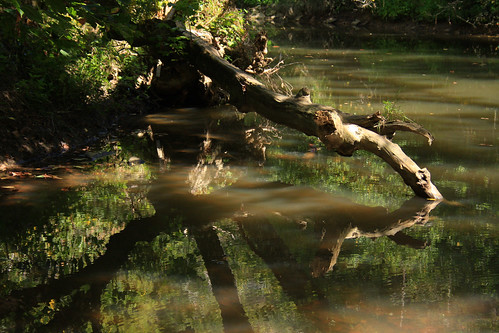
Reflections in a springtime stream.
(*photo credit)
April 1, 2012
Palm Sunday: The Foolishness of a Fickle Crowd
We begin the holiest week of the year, one with its ups and downs
and up again -- a roller coaster of emotion. Furthermore, we begin with palms,
the symbol of victory over sin and death. Jesus enters Jerusalem riding on a
donkey and with a shallow popularity from the general public. Having raised
Lazarus from the dead, Jesus in now regarded as a miracle worker who is
unsurpassed; many in the multitude identify miracle-working with unique
leadership and are coming to believe in him as Messiah-- but not with deep
conviction. Jesus knows how fickle human beings can be, and yet accepts the
multitude's acclamation to a point. However, this glory is only short-lived and
he knows it.
Victory must be long-lasting.
The celebration will fade for such acclaim is fleeting, but we are not fooled
even when we process around our church grounds with palm branches. We await the
spring on Palm Sunday and expect it to come, and so we know that victory is in
the offing, but not yet in early April. This is a victory different from what
the world gives, and so we are not fooled by limited worldly symbols. The
lordship of Christ includes Good Friday and that adds a touch of realism that is
harder to fathom. The spiritual triumph of Jesus as messiah is fundamentally
different, and this comes when death is conquered by Easter's resurrection.
The passion is part of our life.
We believers place ourselves in humble service and show our openness again by
allowing the words of Scripture's Passion narrative to penetrate into our
hearts. We relive the suffering, death and the awaited resurrection of the
Lord. We are called to bear witness to these events and thus be open: to the
rise of emotion on Palm Sunday; the suspension of emotion on Holy Thursday; the
plummet to the depths of sorrow on Good Friday; and the rise again to new life
on Holy Saturday eve and Easter Sunday. The story told in its entirety is an
awaking of the infinite love of God shown in the suffering and death and
resurrection of Jesus.
Replace worldly approval with spiritual reality.
On Palm Sunday we confront our own fickleness, when we say hosanna and yet
realize that standing with Jesus is more than a crowd shouting approval. We
must stand with Jesus during the entire week; we join him in confronting an
establishment during mid-week and the hostility that begins to swell up against
him. To jump from Palm Sunday to Easter Sunday with no emotion in-between is
equivalent to hoping that life starts at birth and then after years of troubles
suddenly passes on to eternal life. Reflecting on the words of St. Paul's hymn
in the Philippians Letter, we are willing to be humbled with Jesus. We resolve
to be with him throughout our lives for this is the test of true sincerity.
Prayer:
Lord, give us the stamina to enter into this Holy Week with hearts open to
seeing ourselves and reaffirming our fidelity to what you ask of us.
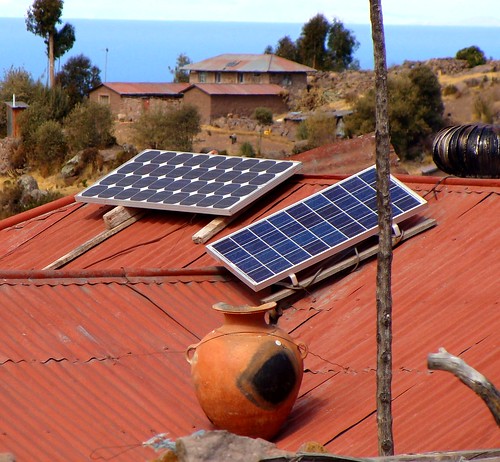
Solar installation on Taquile Island, Peru.
(*photo by Julia Manzerova, Creative Commons)
April 2, 2012
No Fooling: Renewable Growth Is Explosive
The investments in sustainable energy made by the federal government as well as
state and private funders have paid off handsomely, underscoring the
shortsightedness of emerging proposals to cut back on or discontinue such
support.
Ken Bossong
Renewable energy sources are one hope for the future, along with
awareness of pollution and climate change and the need to address our addictive
consumption of resources. This is a middle level -- an awareness that things
are not good and yet some changes will help heal our wounded Earth. We ought to
focus on hydropower as a renewable energy source since it is currently the
largest of the various options. Let us also affirm a mix of renewable sources
that include biomass, biofuels, wind, geothermal, tidal, and solar.r.
Actual renewable energy information lags several months behind the facts that
are occurring -- and this makes reporting somewhat imprecise in an age of
instant demand. However, trends are consistent and need to be reaffirmed.
In 2011 renewable energy provided 12% of domestic energy production, and this
was a growth of 14% over the previous year. When imports are taken into
consideration, renewable energy sources account for 9.3% of total energy use (up
to September 30, 2011). Reference-- U.S. Energy Information Administration
(EIA) documents.
Last year, in comparison with the same period in 2010, renewable
energy production jumped from 10.85% to 11.95% (nuclear was 10.62% and
falling). Hydroelectric (the focus of this month and the major renewable
generating source) jumped by almost 30% over the previous year and accounts for
8.31% of net electrical generation during the first nine months of 2011. Of
interest, from a low starting point (0.05% electrical generation) solar energy
jumped by 46.5%. Wind expanded by over 27% and yet rising expectations for this
competitive energy source are being dampened by anticipated cutbacks in federal
incentive programs.
The future renewable picture is mixed at best. Newly discovered
and tapped natural gas (a non-renewable source for electrical generation) is
rapidly replacing aging coal for power plant fuel. However, renewable energy
stimulus packages along with energy efficiency have led to many dramatic changes
in America's electricity generating picture. Globally, the picture is similar,
with wind and solar generation rising rapidly in many advanced countries.
However, coal-fired power plants continue to increase in number in China (the
number one carbon dioxide emitter), India, and other emerging countries.
For up-to-date information on renewable energy development we
strongly recommend becoming a member of the electronic "Sun Day Campaign" <sun-day-campaign@hotmail.com>
in Takoma Park, MD.
Prayer:
Lord, help us renew our wounded world and promote the use of environmentally
benign renewable sources where possible.

Rusted milk jug from rural Kentucky farm.
(*photo credit)
April 3, 2012
Isolationism Needs to Be Challenged
In this election year proposals are being made by certain
political candidates to close military bases overseas and to cut foreign
assistance. However, there is no need of coupling these two as though they were
partners. In fact, if we regard international insecurity as the reason for
bases, the lack of assisting the poor of the world may be the very root of ever
greater insecurity that could haunt us in the coming years. The basic threats
among many poor people are food insecurity and lack of basic health care. These
individual insecurities add up to a global one when we consider that one person
affects another and another. Insecurity within the human family is global.
Base-closing, yes.
Few if any policymakers speak up for this combination of base closing and
increased foreign aid -- but perhaps they ought. Global security is not
premised on where the "policemen of the planet" are located, since today
battalions can be moved around the world with deliberate speed. Additional
transport planes are far cheaper than permanent military bases. Furthermore,
isn't it better to share security responsibilities with people from other
nations, as we have attempted to do in the past century? Doesn't this include
the "allies" during the Napoleonic Wars?
Foreign assistance, yes.
The
United States only sacrifices far less than one percent of its GDP for foreign
problem areas or hunger, mass migration, poor sanitary conditions, and basic
health benefits. As we mention often in the need to radically share, the
developing world involves one human family; the poor within this family have
been hurt by unfair trade practices and a greedy world that will skim their
resources with little compensation. The poor bear the brunt of climate change
through floods, desertification, and inundated lowlands -- and island nations in
the rising Pacific and Indian Oceans. Assistance is not charity; it is a
justice that must be promoted and installed.
Assistance through base-closing savings.
During tight financial times where will the money come from for foreign aid?
Base closings. These bases cost tens of millions of dollars to upkeep and the
security work could be done by the host nation at lower costs. We do not even
have to argue that troops will have to be decommissioned from the military
services -- just keep them closer to home and train them to be on duty instant
strike forces. Bases are not always welcome mats, but holdovers from outmoded
Cold War times. Besides, many bases such as those in Japan have been cause for
friction among local residents and misbehaving military. In place of hoped for
appreciation is a growing hostility that could be eliminated by troops returning
home, and remaining on duty to be transported to needed areas when the need
arises.
Prayer:
Lord, teach us how to be generous, to see when we are needed and when our have
overstayed the invitation. Show America how to share the great resource gifts
you have given us.
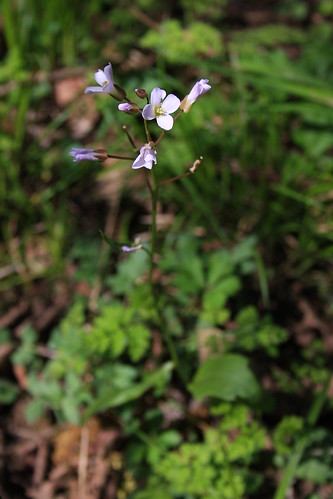
Kentucky native edible herb, Cardamine douglassii, purple cress.
(*photo credit)
April 4, 2012
Passover, Horseradish, and Bitter Herbs
Passover and Easter occur this coming weekend and we recall the
traditions of our Jewish "cousins" in the faith. Their first Passover meal
involved standing erect in travel clothes and included a menu of bitter herbs --
but exactly which specific one (maror)
is clouded in antiquity. Modern Passover meals generally include horseradish,
symbolizing the bitterness of enslavement in Egypt. To this is added sweet
romaine lettuce (bitter if allowed to stand too long before harvesting); lettuce
symbolizes that the sojourn in Egypt started sweetly and ended bitterly in
enslavement.
In my youth, horseradish, one of the many brassicas, was our
predominant herb. The plant is perennial and even invasive under certain
conditions; it requires sufficient cold weather to ensure plant dormancy, proper
fertilizing (e.g., horse manure) to be productive, proper digging and prompt
sauce preparation with vinegar; speed is sought for horseradish can lose its
potency, for "mustard oil" or
allyl isothiocyanate
is unstable when exposed to air. Promptness, liquid conditions, and
refrigeration in sealed containers are keys to good effective horseradish. Our
Easter bitter herb use was not following Jewish tradition for we used
horseradish on country ham (not lamb). For us, the hotter the horseradish the
better. When I prepare homegrown horseradish I have found that the secret in
preparing the herb (requiring only vinegar and a dash of salt as extra
ingredients) is to keep the root under water except for the actual grinding.
Buyers beware of commercial horseradish, for it can be highly
diluted in order not to offend milder American tastes. Was it Heinz who found
horseradish diluted with turnips or other mild ingredients and started his
business with making the pure and hot stuff for customers? Even today,
commercial horseradish comes in a variety of "degrees of heat." One bottle of
"Horseradish sauce" has the following ingredients: soybean oil, water, corn
syrup, vinegar, egg yolks, modified corn starch, horseradish, artificial
flavoring, and three other preserving ingredients. Yes, there is a pronounced
horseradish flavor.
Selecting and preparing just so much horseradish is an art; it can
be a tear-filled process and never fully accomplished without remembering the
bitterness of life; often today's world starts out so sweetly in life's promises
and then we are faced with the bitterness of reality. For foods, take only as
much as one can stand, and so it is not just the strength of the horseradish but
the amount added to the sandwich or meal serving. The secular use of
horseradish goes far back in European tradition and we find Shakespeare talking
about it under the name "Tewkesbury mustard," an old British term. Today, the
rich religious and secular culinary traditions concerning this humble herb are
global.
Prayer:
Lord, help us to discover that bitterness is part of our lives, and that the
culinary arts can enhance the manner in which
we accept our trials and celebrate life all the same.
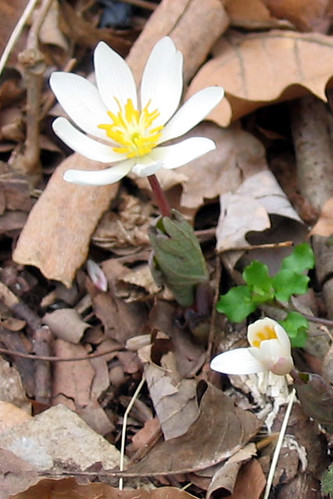
Sanguinaria canadensis, bloodroot.
(*photo credit)
April 5, 2012
Holy Thursday: Richness in Old and New Ritual
Each day of Holy Week has its unique character, and the different liturgies
speak for themselves. For the first three weekdays we see the bitter troubles
resulting from direct confrontation. Here we come to the eve before Jesus'
passion and death, and the story is most dramatic even though it may take our
lifetime to comprehend in some little way.
The Passover is celebrated.
This evening we can look out and see the full "pink" or Passover moon. This is
also Passover for our Jewish cousins in the Faith. The Jewish feast involves
the passing over of the first-born of Israel and the passing over to freedom of
the people when they went from captivity to freedom from enslavement in Egypt.
Blood, symbol of life, is also the sign of passing over from life to death. A
place setting for the feast remains unoccupied, for the prophet who is to
return. The retelling of the story by questions of the youngest indicates
through domestic ritual that tradition is honored by the family.
The Last Supper is repeated.
The evening has three components: the repeating of the memorial of the Passover
and now becoming the New Covenant with the Eucharist; the service rendered in
the washing of the feet and the ordaining of the disciples to carry on this
tradition; and Christ's love shown in word and deed.
The Eucharistic Meal
goes beyond the Jewish Seder. and includes memorial readings and the
consecration of bread and wine into the Body and Blood of the Lord. This
service is to be repeated faithfully until the Lord returns. The memorial
aspect brings all who participate into the suffering, death and resurrection of
Christ himself. The ritual meal includes unleavened bread, the cup containing
the fruit of the vine, the hymns and the prayers of communion together.
Service to others
includes the symbolic washing of feet by Jesus at which Peter objects. However,
Jesus insists; otherwise Peter would have no part in the continued service to
fellow human beings. Christ ordains the disciples present to initiate the
carrying on of this tradition throughout the ages. The apostolic succession
that continues today begins at the Last Supper.
Love must permeate this service,
for here Jesus gives a New Commandment, to love as he loves us. This expands
the frontiers of service way beyond mere charity for its own sake; here the
suffering done in the redeeming act is expected of all to be joined with that of
the suffering Jesus; the goal is a unity of all people into a oneness that is
present in the Godhead. In one way, our own growth in this love will be tested
by the continual celebration of the presence and absence of the Lord as we await
his physical return in glory. Thus, the celebration is bitter sweet.
Prayer:
Lord, help us to enter fully into the feelings of Holy Thursday and, in doing
so, to prepare for what is to follow.

Reflection through a walk in the woods on Good Friday.
(*photo credit)
April 6, 2012
Good Friday: Calvary Extended in Space and Time
Good Friday strikes all believers in different ways: some retreat
into the inner devotions; others go to religious events in sacred places; still
others do exotic feats such as carrying or even being affixed to crosses during
dramatic events such as passion plays. For many of us, this day has an angst
that leaves us unsatisfied, perhaps a mix of shame for past misdeeds and a
recall of failing to assist others. However, God's immense love for us frail
human beings emerges amid our anguish, and even in the darkness of the day there
shines a redeeming light.
Liturgical devotion:
The practice of fasting on this day calls us back to Ash Wednesday with the
Church's mild guidelines. In some cases individuals exceed these fasting
guidelines in an effort to practice something special on Good Friday. Some
visit the church and meditate before the Blessed Sacrament, often during the
night hours between Holy Thursday and Good Friday. Others engage in the simple
but solemn Good Friday service in keeping with the mood of the day. This
service includes solemn readings of the Passion, a series of intercessions,
veneration of the cross and reception of Holy Communion (without Mass). People
leave at the end silently and without a celebratory atmosphere.
Additional devotion:
Through the ages many Christians try to enter with Jesus into his suffering and
death -- extending in space and time the Calvary event that places us on or near
the cross with him -- though two thousand years later. In essence, a vast
devotional literature authored by holy people and a number of saints is utilized
in formal prayers. This has been the historic practice generally after the
Black Death in the 14th century down to and including modern times -- and
elements of these devotions hold greater popularity among certain ethnic
groups. Passion plays, Stations of the Cross, processions, retreats, sermons,
and other devotions are performed according to Good Friday traditions.
Contemporary devotion:
New forms of participation in the Calvary event emerge for those of us who
understand that Christ is in the persecuted and suffering people of any age,
including this one. Christ suffers in the poor, the hungry, the ill, the
forsaken, and the imprisoned. Good Friday is also today. Some may meditate on
the event while giving care to others who are ill or homeless or hungry. In
helping them we join in Jesus' Calvary event. Believers are willing to
sacrifice time, energy, prayers, and even money for the Holy Land upkeep or for
charitable causes; some may be moved to relieve those who are overburdened
caregivers; others may focus on meditative reading or reflection at portions of
this solemn day.
Prayer:
Lord, teach us to look upon your sufferings in a most meaningful manner, to see
you suffering in today's world, and to resolve to address these situations
through actions that we find most attractive.
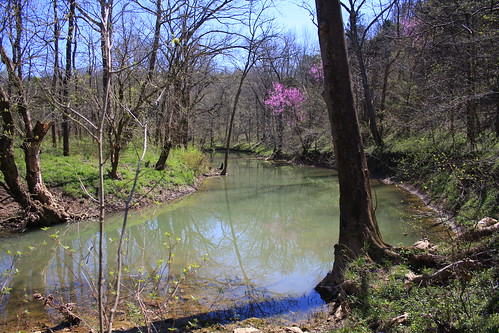
Peaceful scene in rural Kentucky.
(*photo credit)
April 7, 2012
Holy Saturday: Make This a Day of Repose
Often the time between the death of a loved one and the formal
funeral and burial is one or more days in cultures that do not bury people
within 24 hours. This is true in cases where embalming is practiced or where
the body has been sent for cremation, and a lapse of time exists between death
and a memorial in honor of the deceased. This period is similar to time from
Good Friday until the late Holy Saturday Easter events. Some might remark,
"Certainly, you are not giving us things to do or think about doing on this day
of days just before Easter?" It is a time to get one's breath, to do nothing
formal or public, to simply rest in preparation. In actual fact, most believers
are like others in this busy world, and plan secular pursuits such as cooking,
decorating, purchasing, or preparing for Sunday visitors.
Resting on the Sabbath (this Holy Saturday) has a special meaning
today, for here we come closer as Christians to imitate the reverence our Jewish
cousins hold for observing the Sabbath. The more religious Jewish people honor
the Sabbath by resting, not even turning on or off lights, or driving about, or
cooking, or doing anything beyond the prayers and visits to the synagogue. . . .
A preparation for such a strict rest would have to be planned in
advance and it is not the day itself when we ought to change a scheduled set of
Christian practices. True, but if we give special attention to rest on Holy
Saturdays we will prepare ourselves all the more in 2013 and beyond. Therefore,
we ought to start the practice even in a little way this year, in order to do
the repose at greater length in the future (for purchases and preparations could
be done in advance).
Plan less
Say an
extra prayer
Make the meditation period
longer
Sleep-in an extra
hour
Take a longer
nap
Exercise a little
more
Visit the Internet less
today
Omit the Twitter
messaging
Stay home
Shop
less
Curb the
driving
Discover this shortened
reflection
-- and prepare for Easter
tonight and
tomorrow.
Prayer:
Lord,
have mercy on all who rest in you.
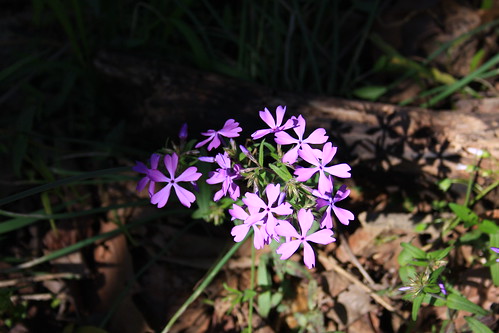
Blue phlox, Phlox divaricata.
(*photo credit)
April 8, 2012
Easter Renewal in Spirit, Life, Love, and Energy
Renewal and Easter go together: the spirit is renewed; the
landscape is renewed, the hope of eternal life is renewed. Here we seek to
express four different but interrelated emotions making Easter a complex
celebration; indeed, we extend the celebration beyond today, Easter Sunday, and
include the next fifty days until the feast of Pentecost. Today we celebrate
victory, joy, hope, and mercy; we are just as overwhelmed as the disciples at
the first Easter when the tomb was empty and he appears as risen Lord.
1. The renewal in spirit
shows the victory of Easter. We are promised eternal life, and this is the
promise beginning to come true with our celebration of the rising of the Lord.
As St. Paul says, our faith would be dead if this does not occur, but it does
and the faith of the believing community enlivens us in hope of
eternal fellowship. We testify that death has been conquered.
2. The renewal of commitment to life
is found here, for victory gives way to Easter hope that the culture of death
can be abandoned and replaced by that of the springtime budding forth a new
life. So we continue to say "peace" and mean that the hope of a more peaceful
world is present on this day of days. Celebrating life in all its forms
includes decorated eggs, certain foods, lilies and other spring flowers, and
colorful clothes.
3. The renewal through forgiveness
shows God's mercy and the completion of our redemption in the suffering, death
and rising of the Lord. Joy becomes complete when we extend God's mercy through
our acts of forgiveness to those who have wronged us in any way. The sacrament
of reconciliation is instituted on the first Easter to show us that we too must
forgive and bestow new interconnected life within the world community. Only
then is the love and mercy of God manifest. Words are comforting at this time
as are the hymns of joy -- He has arisen!
4. Renewable energy
may seem somewhat removed from this spiritual quest, but renewal has many forms
and this ought to include all of life -- spiritual and physical. We await a New
Heaven and New Earth, and we preserve sustainable practices by limiting our use
of non-renewing energy sources. Easter testifies to the need for sustainability
and abandons any effort to terminate or diminish resources. Renewal is a
necessity for us in our enhancing the quality of life for all people. By
tapping renewable energy resources we provide a higher quality of life for all.
A Resurrection-Centered approach means that we welcome new ways of
improving our world and open ourselves to the possibilities of simpler ways of
living wherein all people can enjoy a higher quality of life.
Prayer:
Lord, show us the fullness of your Easter presence; allow us to be Easter
people in this troubled world who express joy, life, hope, and energy that comes
with victory over death.

Special Easter Reflection: Global Warming Close to Irreversible
During the Easter Season we are called to transform what may seem
to be hopelessly lost and renew what is possible. The climate change crisis
fits this category, as this country and the other two major greenhouse gas
emitters (China and India) are doing so little to address this critical issue in
a forthright manner. Even though over one quarter of the people of this country
think that there is no human-caused crisis at all, only variations in normal
weather patterns, scientists meeting in London think otherwise.
Ken Bossong of the Sustainable Energy Coalition reported in his
daily energy news abstracts (March 28, 2012), entitled "Scientists Warn Global
Warming Close to Becoming Irreversible," the following:
-------------------------
The world is close to reaching tipping points that will make it
irreversibly hotter, making this decade critical in efforts to contain global
warming, according to scientists gathered at the "Planet Under Pressure"
conference in London. Scientific estimates differ but the world's temperature
looks set to rise by six degrees Celsius by 2100 if greenhouse gas emissions are
allowed to rise uncontrollably. As emissions grow, scientists say the world is
close to reaching thresholds beyond which the effects on the global climate will
be irreversible, such as melting of polar ice sheets and loss of rainforests.
One of the most worrying and unknown thresholds is the Siberian permafrost,
which stores frozen carbon in the soil away from the atmosphere. In a worst
case scenario, 30 to 63 billion tons of carbon a year could be released by 2040,
rising to 232 to 380 billions tons by 2100. This compares to around 10 billion
tons of CO2
released by fossil fuel use each year.
---------------------------
Remember that a "tipping point" is that point beyond which there
is no recovery -- a runaway condition. Hence all programs related to energy
conservation and renewable energy substitution must be undertaken post haste in
order to reduce dependence on ALL fossil fuels, even the plentiful and highly
popular natural gas obtained by the new fracking process. Since methane, the
main constituent of natural gas, is twenty-five times more influential in
greenhouse effects than carbon dioxide -- and as much as two to four percent of
that gas may leak in drilling and processing -- the increasing popularity of
that fossil fuel may actually be hastening the arrival of the tipping point.
We must muster all resources at hand to inform leaders, policy
makers, and the general public of the critical issues right now before us, and
do all in our power to see that this issue is given its rightful place for
immediate consideration, especially by candidates for national political
office. We are enabled to do our part through the power of the Risen Lord.
Happy Easter!
The Earth Healing Team
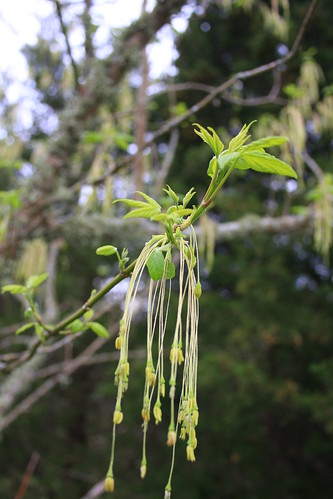
Box elder, Acer negundo, a native Kentucky tree.
(*photo credit)
April 9, 2012
A Manual to Debunk America's State Religion
We are constructing a manual to help direct the rage experienced
by those who see injustice in disparity of wealth. Turning rage into productive
energy is the goal of this exercise. Uncontrolled rage can lead to people being
physically hurt or killed and little positive benefits achieved. Why allow the
condition to degenerate into thrashing about and then a return to the status
quo? Channeling pent up energy to profound and meaningful changes is what we
seek to achieve.
What is the basic message?
The
basic message here is that the wealthy do not own their loot removed from the
essential need of their fellow human beings -- no matter how legitimate they
think they acquired "their" wealth. Retention is an unjust act when people are
in desperate need of these resources. This message challenges "free market
capitalism" that is regarded by many, whether acknowledging it or not, as
America's state religion. The wall of separation of church and state needs to
be applied here.
Why the difficulty?
To take what is rightfully "ours" does not mean a selfish regard for this or
that being mine and not yours. "Ours" refers to a collective commons; this
includes liberation of wealth from the strong fist of individuals who have far
more than necessary for higher quality life. To
retain
large
amounts of wealth is to hold this back from the needs of those who are
desperate, and thus their condition augments global insecurity and lowers the
quality of life of all who are within the commons.
Why a manual over and beyond
Reclaiming the Commons?
Urgency calls us to act immediately when and where possible, for our planet is
in trouble. The disparity of wealth is so immense that if something is not done
soon the world may explode in various forms of violence, so immense that a few
will seek to thrash out at someone, somewhere. Cautioning patience is NOT the
Christian thing to do; it is a drug to the addicted. The hungry find patience
difficult, and so ought us all for their sakes.
Do words equal deeds?
Acting is done in two ways: written and spoken word, and physical protest or
confrontation. As a senior citizen near eighty and with flagging energy I am
more inclined to word (though an activist in past decades) than public deed. A
manual must include written word or it is no manual, and so the writing of it is
an act in itself. It has the potential to be smothered by the verbosity of an
Internet of chat and blog -- and thus less influential than deed. I must defend
my potential contribution and why it is the first part of the manual. The word
has power as Thomas Paine testified in "Common Sense," immediately prior to the
American Revolution. Words call for reflection and yet they must be plainly
expressed and widely distributed.
Prayer:
Lord, allow us to enter into the reclaiming process with all the skills we have
at our disposal at this moment including the technologies of instant access and
dissemination.
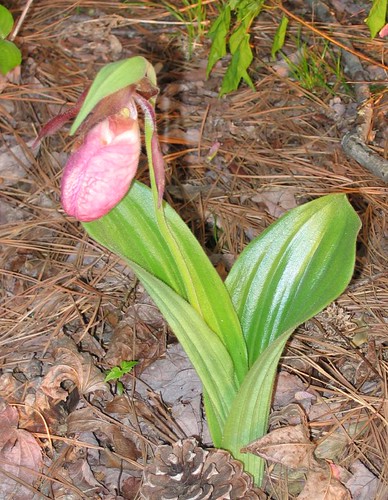
Lady's slipper orchid, Cypripedium acaule, Red River Gorge.
(*photo credit)
April 10, 2012
Should We Defend Today's Robin Hoods?
The issue of a modern Robin Hood can elicit various emotions: fear,
disgust, puzzlement, anger, even hope. Consider the proverbial first Robin Hood
was responding to unjust conditions of medieval England. Do such conditions
exist today in the retention of vast amounts of wealth in tax havens? In the
coffers of corporations and individuals that could be used for employment and
development of resources for the poor? In the legitimacy of acquired wealth? In
the power to transfer wealth rapidly through unregulated globalization? In the
silence of intimidated individuals who fail to speak out prophetically against
injustice? In the continuation of world hunger and lack of health resources?
Perhaps Robin Hood tactics are needed today and the agent of change
must either act within permitted structures or go beyond them in some
circumstances; provided the agent looks beyond self-interest to the public
good. In a world of accumulation of vast wealth when other means of
redistribution are paralyzed by people in power, some circumstances may call for
actions that some hold to be illegitimate. A redistribution of goods may be
justified as a counter weight to injustice. Mere inaction becomes an unjust act
in itself and this must be countered by acting in justice preferably by groups,
but if need be by individuals.
Some may argue that to encourage Robin Hoods will lead to a break down
of property rights. The so-called sacrosanct notion that some can control vast
amounts of resources and others nothing is already a breakdown of property
rights, for stewardship of resources never in the divine order of creation meant
monopolizing control mechanisms. The breakdown is current and corrective
measures must be effected, if not by the general population due to a powerless
condition, then by Robin Hood forays that publicly call for changes in the
dysfunctional system as we know it.
Actually, the actions of Robin Hoods are not the greater danger. The greater
danger is that religious authority will use moral words as an opiate to keep
people from taking what is rightfully their part of the commons. It is not the
Robin Hoods who are to be condemned but the ones who retain what is not
rightfully theirs to hold. To subvert religion into saying all must be tranquil
in times of troubles is to ignore demands on people to revolt against unjust
systems.
Robin Hoods become systematic shakers and ought to be praised and
encouraged to do this. Should Robin Hood practices impoverish the wealthy then
they are agents for bringing them Good News, which as impoverished the affluent
can be saved now that wealth is removed. Isn't it time to address the privileged
class and its lack of social critique? Aren't the ones called to do this in
many cases the modern Robin Hoods?
Prayer:
Lord, teach all to act according to the Spirit, and to champion methods that
will bring justice to our world.
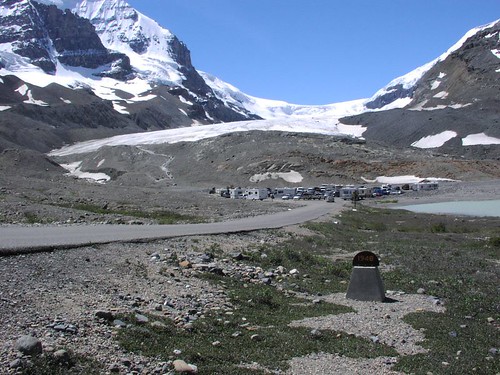
Receding Athabasca Glacier, British Columbia.
(*photo credit)
April 11, 2012
Global Warming Day Revisited
Much has been made in the last two decades about the warming of the
planet. No one denies that we have warmer summers and some unusual weather in
recent years, but the deniers say it has natural causes and not anthropogenic
(human) causes. The battle seems to be between members within an earnest
scientific community over data and facts. The book
Merchants of Doubt
by
Naomi Oreskes and Erik Conway refutes this claim and shows that in seven areas
(cancer due to smoking, Strategic Defense Initiative, acid rain, upper
atmosphere ozone depletion, environmental tobacco smoke, global warming, and DDT
effects) the same naysayers were at work spreading doubt about environmental
claims. The naysayers were scientists of the cold war era but not experts in
their areas of denial. In fact, these were under the explicit hire of companies
that were profiting from extending practices that should have been halted years
before -- but fostered profits through lack of regulation.
This naysaying on all of these mentioned environmental matters has the
same effect, which is, demanding "balance" in these issues that have already
been settled scientifically -- as though matters are unsettled. The popular
media has been persuaded that controversy continues to exist where the vast
majority of the scientists in the area of expertise have a common consensus.
The profit makers take to themselves the upper hand and thus can call into doubt
the probabilities always inherent in peer-reviewed scientific method -- and a
public that does not understand scientific methods immediately accepts that
controversy exists and thus they are able to doubt what in almost all certainty
is going to come to pass.
Global warming stands before us as a scientific fact. The Lord tells
us when we see red in the sky at certain times we know that rain is coming. If
we can tell the weather, we can tell what is happening here. These purveyors of
doubt have been hired by a group of commercially funded foundations and think
tanks sponsored lavishly by major profit-makers to sow doubt, and thus delay
regulatory action that is utterly needed to take corrective measures. In fact,
deliberate efforts are being made to destroy the Environmental Protection Agency
and other governmental regulatory agencies through making this environmental
denying a partisan issue -- and this is having grave consequences.
It is
our duty through the practice of prudence to speak out at this time on this
important matter. We are to discover what is wrong with the world around us and
to speak up for the good of our people. If we are to reduce carbon dioxide
emissions and the feedback effects that allow for the more dangerous release of
methane in Arctic regions, then we must take all prudent steps in reducing the
anthropogenic effects that we now observe.
Prayer:
Lord, help us to see what is coming and to act as prudent people in taking steps
to avert disaster.

Dutchman's breeches,
Dicentra cucullaria.
(*photo credit)
April 12, 2012
The Right Word at the Right Place and Time
Words can be powerful in many different ways, and that is what drives
us to converse, phone, sing, preach, encourage, counsel, promote, and inform
others. The spoken and written language at the right place HERE and time NOW
and to the right audience WE can have immense effects. In fact, if we thought
that the dysfunctional culture in which we find ourselves could not be changed,
we would be reduced to total silence. Expressing word in some manner is a
confidence that future change can and will occur. Some are better adapted and
skilled in writing the word; others have a charism to speak in a manner to move
audiences, to make them laugh and to make them cry. However, the Internet,
along with radio and television, allows many with little effort to blog and chat
with at least an audience for a moment or two. That raises the question: do we
know what is the right place and time to speak?
Often at a funeral we are left speechless, for we do not know what to
say to express condolences and words fail us. The hug or sympathetic look is
all we can give -- but it can be comforting and really appreciated. The right
expression is called for, but this is not necessarily through words. However,
we may be miles away and the phone call or the email or long-hand letter is our
manner of communication. Here the power of word becomes all the more critical
because our facial expressions may be unseen at this occasion. Words can build
up or destroy, encourage action or dampen enthusiasm, comfort or distress,
inform to right or to wrong approaches, move to good works or misdeeds. With
time and through many stumbles we learn the art of expressing ourselves in the
ways that are best for us, but this takes the intuitive awareness of where we
are and what we must say or write at this moment.
Just after ordination during the Vietnam War I recall a trying moment
during early pastoral work; the head chaplain at Great Lakes Naval Base
delegated me to tell a marine (who had been a jogger) awakening from surgery
that he had lost his leg. What could I say? "One foot is in the grave." NO.
"You still have one good one." NO. "Offer it up." NO. I was left to simply
looking him in the eyes and giving him the information with little or no
fanfare. I felt my inability deeply, and hoped he would realize it, for all
words come from some kind of heart. Making heart and head work together is what
is needed in times when words are difficult.
Sometimes we fail to realize that we are empowered to express
ourselves at the right place and time, and that this empowerment comes through
the power of the Risen Lord. We can renew life in others through our word for
we participate in the WORD who is within us and the Spirit who directs what we
are to say. I notice on rare occasions I am speaking, and am aware that what I
say comes not from me but from the Spirit speaking through me. Others have told
me they have had the same experience.
Prayer:
Lord, place us at the right place, energize us at the right time, and give
us the words to say and write as needs be.

Jefferson salamander, Ambystoma
jeffersonianum, which can live to an age of 30 years.
(*photo credit)
April 13, 2012
Thomas Jefferson and Power of the Word
Thomas Jefferson, a president of many talents, certainly was a
writer in ways none of the others of that mixed lot of early patriots could
equal. Each year on July 4th when NPR morning news includes the rereading of
the "Declaration of Independence" we become aware once more of the power of the
written word as crafted mainly by the Continental Congress delegate, Jefferson.
We are moved by the word and discover that it has two aspects: origin and
destiny; what is expressed and what is received and reflected upon.
Jefferson expressed openly the courage of his convictions. He
fashioned his thoughts in an expressive manner by declaring the independence of
rebellious colonists -- a very daring act. He attacked the royal head of the
colonies, and spoke with anger and yet in a most reasonable fashion. Jefferson
wrote for readers living up and down the Atlantic coast and some colonists
scattered inland; amazingly, these were generally readers who reflected and who
responded through coalescing deed. Note that what happened included a good
writer and good readers without which the deeds that followed would not have
been as effective. A symbiosis resulted, becoming what was intended through
positive reception.
Words have power in two ways: well written to motivate; and well
read to be motivated. I never have called myself a writer no matter how many
words written in an age where writing is far easier than in Jefferson's time.
Researcher, yes; writer, uncertain. Why? Perhaps we lack power today to move
and to be moved. Is there a crisis of word or one of power working together?
Power may rest in the word if that is eternally spoken, but is that our case?
One possible theory is that the power rests in the writer/speaker
determined to extend power from what is created to those intended to receive
it. If the person writing or speaking is firmly convinced that power can be
transmitted then it will, at least for a period of time and to a limited
audience. Interestingly, trust in the power of the word may be through
charismatic writers or speakers, and with listening hearers. In this age of
electronic books, blogs, emails, Twitter and Facebook, written word is easily
composed and easily received -- and without reflection there can be no
meaningful resulting action.
Today, can word have power to heal our wounded Earth? Yes, it can
but only if delivered with a faith in the future and received in a similar
manner. The generator of the words must acknowledge that power comes from God
working in and through him or her. Eternal or long-lasting change can occur if
we believe in the power of the eternal Word. Words expressed during the French,
Russian, or Chinese Revolutions had only temporary and transitory power. What
we seek here the eternal Word, who brings about profound change in our lives.
We seek God's power at work in us.
Prayer:
Lord, empower us with the eternal Word so that we might assist in the preparing
for a New Heaven and New Earth.

Anticipating a summer treat: Kentucky wild
raspberries.
(*photo credit) April 14, 2012
Review Culinary and Commercial Sweeteners
On Pan American Day we recall the hemispheric contributions that we take
for granted, especially that multitude of foods from potatoes and squash to corn
and certain beans. Often we overlook one food that has only recently gained
acceptance as a non-caloric natural sweetener, 25-30 times sweeter than refined
sugar, namely "Stevia." Reluctance to approve this South American herb stems
from its low price and commercial bottom line -- for it is far cheaper than the
normal commercial sweeteners:
Sorghum is the prime Appalachian sweetener for cooking and is made as an autumn ritual after growing sorghum cane in the region. Firsthand experience tells us that the sorghum quality varies depending on expertise (see "Making Sorghum" August 30, 2006).
Honey, a prime mostly natural sweetener, is available from local domestic producers but is an expensive commercial food item when filling the grocery list.
Maple syrup is a more northern (New England and Canada) sweetener that is a glory for certain cooking, especially pan
cakes for breakfasts on cool days. It is also expensive.
Molasses is a sugar cane refining byproduct that was popular in earlier times. The "black strap" variety was bought by our dairy by the barrel and even though of strong taste it made our mouths water as hungry kids fed cows just before supper time.
Corn syrup comes in the cheaper end of the sweetener line and yet many swear to lay off this high calorie food with sucrose base.
Refined sugar is used in cereal and in many cooking menus along with desserts of every tempting shape, color, and taste. Even the meats (sugar-cured ham) are not immune from the cook's hand in the sugar bowl. Obesity soars -- and efforts to refrain from prepared foods and sugar-loaded soft drinks are promoted.
Artificial sweeteners have their place when the hot beverage drinkers demand a more suitable taste to their drinks. As in everything else, just recall moderation in all things.
Fruit of all types are preferred even though when out of season these can be expensive food items.
Natural low-calorie sweeteners could be called by some of the sages of the dinner table the "top of the sweetener line." Besides the suggested stevia, another 100% natural organic western hemispheric sweetener is agave nectar coming from Mexican cactus plants. People like sweeteners, and so let's consider good Pan American varieties at this time that are natural organic ones.
Prayer: Lord, help us discern what is best and sweetest for us.
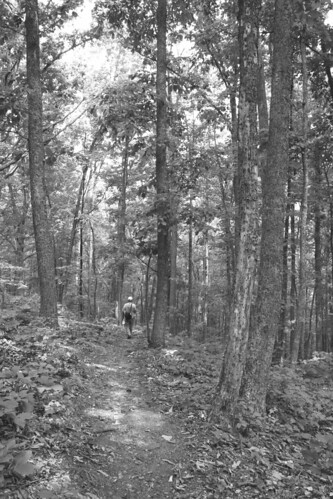
Finding one's way in the forest.
(*photo credit)
April 15, 2012
Belief, Unbelief, and God's Mercy
The disciple Thomas becomes a central character in today's Gospel
message (John 20: 19-31). It is a sense of divine humor that this person known
through the ages as "doubting Thomas" would have the privilege to establish a
2,000-year-old Christian community that has endured and is known as "Thomas
Christians." Throughout the centuries these Indians have been loyal to
Christ.
Belief
is a challenge in every age. All human beings take a spiritual journey. In
this year of Mark's short Gospel we fill in with chapters on faith struggles as
mentioned in John's gospel. We focus on these during Lent: Chapter 4
with the Samaritan women at the well and in Chapter 9 with the man born blind
who testifies to Jesus within a hostile environment. Here in Chapter 20 Thomas
doubts and insists on physical evidence in order to believe in the Risen Lord.
We, who do not have that access to physically touching the wounds of the
resurrected Jesus, still can witness to wounds found in the suffering of our
brothers and sisters all around us. Believers who champion the extension of
Calvary in space and time, experience Jesus as suffering in our brothers and
sisters today. Doubts are overcome in the community of today's suffering
souls.
Unbelief
is countered through expressed showing of wounds. Jesus calls for more than
physical examination of his wounds. Jesus shows tolerance for Thomas who
doubts, and helps each gently and mercifully find the depths of faith. In fact,
the test of our own faith is how well we assist those struggling to come to
faith -- how much we imitate Jesus who is so merciful to sinners and yet who
demands that the past does not hinder a turning to faith here and now. Unbelief
confronts our doubting world, especially in materially advanced countries where
Christians have abandoned their traditional faith in droves. Europe and North
America stand out for this abandonment and thus the opportunity opens up in this
Year of Evangelization to return to faith.
Mercy Sunday
is a relatively recent designation and yet it fits so well here in this period
in history. God always shows mercy on a wayward people and loves us all whether
believer or unbeliever. Of course the invitation is always to overcome the
temptation to abandon faith, to accept the Spirit's call for faith, and to grow
in that faith even during trying times. The demands are ever greater that we
struggle to find ways to testify to our own faith in and through both word and
deed. We can certainly tell loved ones how much their lack of faith hurts us.
God's mercy is not just in our individual lives as believers, but works in the
lives of all people. We testify to the waverers and unbelievers how much faith
means to us, as well as how much their lack of faith hurts us. God's mercy
inspires us to show mercy to others and to gently and firmly testify to faith
and invite others to come to faith in their own lives.
Prayer:r:r:
God of mercy, look upon us and heal our unbelief both as individuals and as
communities of people. May we trust you!

Rhododendron maximum, Cumberland Gap National Historical Park.
(*photo credit)
April 16, 2012
The 2011 Award for Bad Climate Science
Earlier this year the Pacific Institute in California gave the 2011 Climate B.S.
(Bad Science) Award to the entire political collection of New Hampshire
presidential primary contenders. The Institute stated that "Not a single one of
the Republican candidates for president has a position on climate change that is
consistent with the actual science accepted by 97.98% of all climate scientists
and every national academy of sciences on the planet." Also, the Institute gave
one runners-up award to Fox News and its parent company, Rupert Murdoch's News
Corporation. Also sharing the honors were controversial climate scientists Roy
Spencer and William Braswell, and fossil fuel billionaires David and Charles
Koch; these funded "studies" by climate-change deniers and election campaign
writers. Big money talks and the media regard this as a legitimate second side
whether scientific or not.
Our website here seeks to be removed from partisan politics as
much as possible; however, those who are environmentally concerned are pushed
into a corner that the earlier environmental movement never had to contend with,
namely regarding science as partisan politics. The perversity is that in so
doing, anti-science demands equal time and rights. By such a stance defending
climate change is apparently placed outside of the purview of the 501-c-3
requirements. Political partisanship has co-opted the debate. The merchants of
doubt gravitate to one political party and then attack real science as though it
is a "political" issue.
The insidious purpose of the funders of this drive to doubt is to
prolong controversy and thus halt efforts at regulating carbon dioxide, a
climate changing gas -- and allow continue high profits to polluters. Thus a
major environmental issue is relegated to the arena of free market and lack of
proper regulation; this repeats the same strategy used by doubters in the `1960s
well after the cancer-causing effects of tobacco smoke were scientifically
proven. Honesty is the victim. Since the advent of the Tea Party movement in
2009 a rash of denials of any anthropogenic climate change has occurred, though
some less doctrinaire deniers will say that human action is a minor cause,
knowing that humans caused everything from soil erosion to forest clearcutting
and this is evident to all.
Partisan-inserted doubts are exacerbated by a media that prefers
to promote controversy. "Let's make this a two-sided issue and bring in the
opponents." Thus, scientific method is called into question and the virtue of
prudence is ignored; see December 29, 2010 "Prudence and Climate Change
Deniers." Extending denial periods is the goal of greedy economics; proponents
extend the time span when high profits accrue to Big Oil and others. In 2009
Exxon Mobile earned $17.6 billion but paid nothing in taxes; in 2008 the same
firm earned $45.2 billion. Ironically, installing non-polluting renewable
energy systems could still reduce the ill effects of climate change if we act
with determination right now.w.
Prayer:
Help us, Lord, to see clearly the signs of the times.

Sericea Lespedeza, See "Least Wanted" poster for this plant at:
www.nps.gov/plants/alien/fact/lecu1.htm
(*photo credit)
April 17, 2012
Focus on Controlling Invasive Species
Invasive species are a problem with any natural habit and in
places like our nearby Natural Bridge State Park workers with volunteers wage a
war to eradicate various invasive species such as kudzu. On February 17, 2009
"Tackle Invasive Species," we mentioned that some environmentalists called these
species the most serious environmental threat, but they may have to concede now
to the climate change issue. Species can move rapidly to new territory lacking
natural control agents and modern land, sea and air vehicles and vessels
exacerbate this invasive species problem.
In an age of globalization and an imperfect understanding of
spread of species, we have had and even promoted bothersome invasions of a host
of unwanted plants (and animals): tree of heaven, bush honeysuckle, Russian
olive, burning bush, Japanese barberry, Oriental bittersweet, crown vetch,
Japanese honeysuckle, garlic mustard, and on and on. "Wait," you may say, "I
like this or that one, the flower, the color, the smell, the verdant look of the
invaded landscape." However, the senses can be easily deceived unless
accompanied by a proper ecological understanding.
No exotic species that is a potential invasive should be
introduced until its growing habits and controls are fully understood. Granted,
many exotics are not invasive. Here federal and state regulations are needed to
control commercialization of exotics after environmental impacts are assessed.
Culprits include pet and feed stores, nurseries, and home supply centers.
Invasive plant species can crowd out native ones and even affect wildlife and
beneficial insect populations. Diversifying is not necessarily a good practice
without proper controls -- and yet it is a goal of some self-styled
"naturalists." Sound ecology practices include:
1. Assembling a list of worrisome regional invasive species; it is
true that some are naturalized and do not have the likelihood of spreading --
but which ones is the important problem;
2. Selecting only native plant species in your growing areas or at
least naturalized ones that are annuals and not in danger of spreading. This is
especially pertinent for residents living near public forest and park areas;
3. Eradicating already existing invasive species such as kudzu or
garlic mustard, even if you like having the invasives around for some invented
practical reason;
4. Pressuring nurseries and home sales places to refrain from sales of invasive
species and for regulatory agencies to enforce environmental protective measures
generally already on the books;
5. Stopping stripped mine land reclamation using Russian olives
that birds spread by eating and emitting seeds; and
6. Recruiting volunteers to assist in manual eradication of
invasive species especially in vacant urban areas, cemeteries and public parks
and trail areas.
Prayer:
Lord, teach us to respect nature; alert us about introducing exotic species that
may prove invasive.
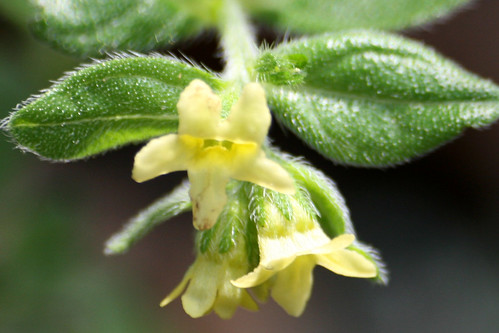
Yellow horse gentian, Triosteum angustifolium.
(*photo credit)
April 18, 2012 Recall
April Memories
Today I can hardly recall what happened a week ago unless I check my necessary
daybook. When I go out I take precautions: I used to have to check whether the
fly was open and shoes tied; now I check whether I have on trousers and shoes.
Such are the concerns of aging. However, some of us are blessed with the
clarity of past memories and treasure this a passing gift even when colored and
faded with time. Others regard forgetting to be a benefit.
April Memories
What month of the past has more vivid memories?
Twinkling Christmas lights or new-fallen snow?
Or summer steady heat or autumn colorful leaves?
What about April's scenes unfolding in fits and heaves.
April is the month of tulips and daffodils,
of carpets of yellow dandelions
in close-cropped pasturelands,
of multicolored wildflowers in happy clans.
Spring brings the hope of an eternal Easter,
of sprinkling Easter water on the fields,
of spiritual empowerment to our mirth,
and springtime cheer awaiting
summer's birth.
April brings on warm welcome showers
soaking newly plowed garden soil
and gives the produce's early stroke
with rosy radishes and sprouting poke.
April ushers in the strengthening sun
that reddened unprotected arms and necks,
giving joggers sweat-soaked chins,
and aching feet, and skinned up shins.
April's memories hold a present tense,
since past emotions stick to the bones
and seem to almost eternally reign
to produce the pleasant thoughts recast again.
True, past memories are unconfined to certain times,
but in reality on closer thought
spill forth when sought to be of comfort,
and left forgotten when a disturbing sort.
April may become a favorite month
with its faded memories of past events,
with the great outdoors inviting once again
and a bare-foot season raring to begin.
Prayer:
Thank you, Lord, for giving an aging life a balm well worth comfort in fading
memory and rising eternal hope.
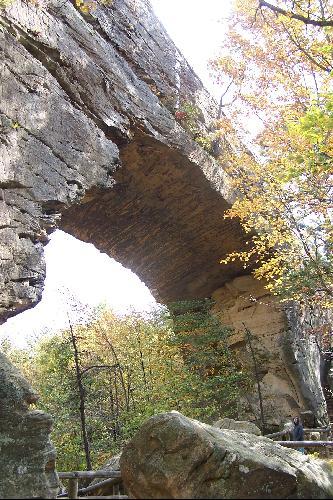
Kentucky's Natural Bridge
(*photo by J. Stephen Conn, Creative Commons)
April 19, 2012
Natural Bridge in My Parish Bounds
The Kentucky Natural Bridge State Park that is located with my
parish boundaries is a popular tourist site. For years this is where I made my
annual retreat until the camping conditions proved too difficult for a senior
citizen. Still I take visitors there, to climb to the natural bridge itself on
some excellent trails, and to pick wine or fire berries in a small cemetery
located within the Park boundaries (and I even buried someone there). The park
is attempting to keep itself pristine and free of exotic species and thus the
eradication of wine berries, one of my favorites.
The rock formations are spectacular in these areas (see "Red River
Gorge," April 12, 2007). The rocks call to climbers who come throughout the
year from distant places. So do hikers who use well-maintained paths and trails
to reach the crested Natural Bridge. In fact, the area has a second natural
bridge called
Sky Bridge,
which is even more accessible to tourists by driving nearby and hiking to the
top without an overly exerting walk.
The Natural Bridge State Park also has superior lodging facilities
besides excellent camping sites for vehicles and for primitive tenting,
plentiful covered picnic grounds, a well-known eating establishment, various
well constructed nature trails with various levels of hiking experience from
mild to difficult, a popular swimming pool, a swinging bridge, a gift shop, and
a chance to see wildlife on occasions. Other facilities are supported in the
vicinity; boating is possible on a river that is not too far away, as well as
horseback riding. All in all, there is fun for just about everyone desiring an
outdoor experience. A few miles away, the U.S. Forest Service maintains a well
designed Glade interpretative center that is an educational experience for all
ages including interactive displays.
We are blessed in having this state park and designate it as the
epicenter of eco-tourism in Kentucky. With more aggressive promotion, this
should even become more popular for both the athletically inclined and for
sightseers, the number one tourist group. Well-managed tourism is high quality
experience that gives satisfaction to many visitors and workers alike, and is
one of the more popular in Kentucky's well-developed state park system.
Blessings include rich scenic beauty much of the year, reasonable prices, good
neighbors, few threatening wildlife, dedicated guides and police, and ample
camping facilities along with good road access to the park. It is generally not
overcrowded, but reservations for lodging are required ahead of summer's
rush.
Prayer:
Lord, help us to promote the sightseeing and outdoor experiences of natural and
scenic areas of our country, and to do so with a sensitivity to retain the
natural potential of the selected sites.
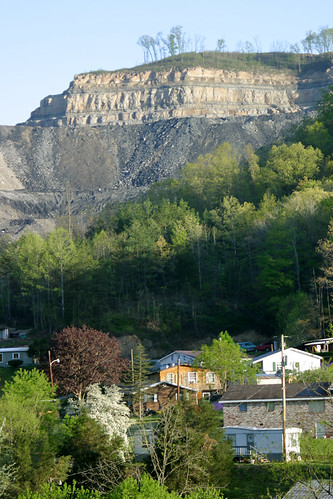
Mountaintop removal mine above homes in Pike Co., KY.
(*photo courtesy of .iLoveMountains.org,
by Matt Wasson, Appalachian Voices)
April 20, 2012
Mountaintop Removal and Its Costs
A phenomenon occurring in the coal-bearing portion of Appalachia
is corporate purchasing of entire mountains. Focus is then given to cutting
these mountains down layer after layer and extracting the coal, mainly for
electric generation. Most people are familiar with fossil-fuel-emission
problems associated with particulate and sulfur oxide pollution from
coal-burning, along with carbon dioxide emissions and resulting "greenhouse
effects." However, additional mountain top removal problems exist.
Environmental water problems:
These result from dumping quantities of "overburden" or non-coal rock and soil
in some nearby place, and that generally means burying streambeds that flow at
the bottom of the mountain in question. Water is polluted by this added
material and the diversion of runoff rainwater to other streams in the vicinity
is an added problem. Legal opposition to mountaintop removal has focused on
these water problems.
Community and economic problems:
The loss of a neighborhood or a viewscape is not often regarded as of
importance, but the cultural life of a given region may be at stake. Losing a
nearby mountain among people who treasure these as God's gifts (see
Mountain Moments)
must be regarded as worthy of consideration. From an economic standpoint,
ruined landscape harms the tourist industry and dissuades retirees to return to
their original home neighborhoods; both tourism and retiree communities are
counterpoints to the economic argument for surface mining jobs (far fewer than
deep mining employment). Loss of land beauty can result in loss of community
worth, a deterioration of the quality of life in a given area. Granted, this
externality is hard to quantify in dollars and cents. However, community
cohesion is a reality that can be sociologically described, and is self-evident
is cases where physical environment is damaged or trashed.
Escaping methane:
Coal mining accounts for 10% of methane release in the U.S. In deep mining, the
safety of miners is at stake when the mine is not cleared of accumulating
methane from the mining operation. Explosions such as the Upper Big Branch Mine
in West Virginia on April 5, 2010 that killed 29 (the worst U.S. mine disaster
since 1970) result from methane accumulation. However, while surface mining has
better worker safety records, still escaping methane has about 25 times the
greenhouse effect as does carbon dioxide (over a 100 year average) and an
astounding 72 times (if averaged over a 20-year period). (Reference: IPCC's
Third Assessment Report). In surface mining operations, methane dissipates and
does not accumulate as in closed underground mines, but methane escapes
nonetheless -- and is a major environmental problem that a coalition of groups
since 2010 has sued to control. According to them, coal mines should be held to
the same Clean Air Act standards of the coal-fired powerplants.
Prayer:r:
Lord, give us the clarity and honesty to address all problems associated with
environmental impacts of coal mining.
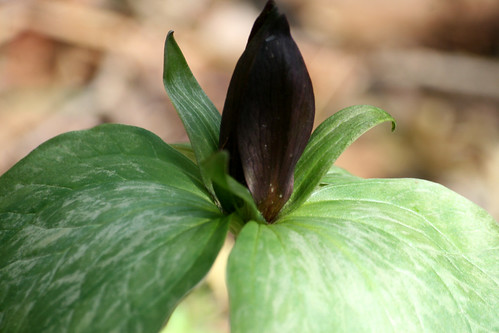
Sweet Betsy, Trillium cuneatum.
(*photo credit)
April 21, 2012
Earth Day and Easter Empowerment
Earth Day
is so important that some suggest extending it to "Earth Year," but special days
afford special and needed emphasis. So an Earth Day has been celebrated (or
better) designated some forty-three times, with each embracing a deeper call to
save our troubled planet. Observing the day does not mean people appreciate the
demands that are being made on all of us to respect this fragile orb, which
could be irretrievably damaged by our misdeeds.
Earth Day harkens to an urgency, a window of opportunity to take
corrective action that is slamming before our eyes. The 2010 5.5% rise in
carbon dioxide emissions is alarming; further distress comes in the estimated
2.5% rise in 2011, especially when we recall a few years back that both years
were supposed to be periods of reduced greenhouse-effect emissions. Then there
is the added compounded and feedback specter of emissions of far more damaging
methane from the thawing Arctic region and some from other practices such as
fracking of natural gas and coal mining. People are starting to despair as to
whether the advent of renewable replacements for fossil fuel will come fast
enough before massive temperature rises might occur.
Our environmental awareness certainly has deepened since the first
Earth Day. In that early period people were becoming aware of the effects of
DDT and other pollutants of land, sea, and air, and how pollutants affected both
human and animal and plant life. In these early times agencies were set up and
regulations were drawn up to handle the pollutants. Over time attention shifted
from negative (pollution) effects to development of alternative less polluting
practices; the onus shifted to remedial ways to change, some of which proved to
be merely tweaking environmental damaging practices to BRIC and other emerging
nations where large populations wanted to join the polluting consumer ranks. In
fact, the dysfunctional economic systematic causes were not yet addressed. In
recent years, Earth Days have been times to focus on our inherent addictiveness
that cannot be answered by tweaking the system. We must change priorities and
the way we do things.
In this broader view, every day must become an Earth Day because
the life-threatening troubles are so grave. We need to be treated as addicts
and learn that mere rationality is no full response. We must turn to trust in
God that we are powerless without divine assistance. We can only become
empowered through the faith in the resurrection of Jesus and the power of his
lordship. God is in charge and we must acknowledge this in its fullness. The
Lord has come among us; we have joined into the saving action of Christ; we are
further empowered in reflecting on what must be done to heal our wounded Earth.h.
Prayer: : :
Lord,
you ask as to whether you will find faith when you return. Give us the gift to
see the power you place within us in the empowerment of the Holy Spirit, and the
enthusiasm to carry this forth to an addicted world in need of conversion.
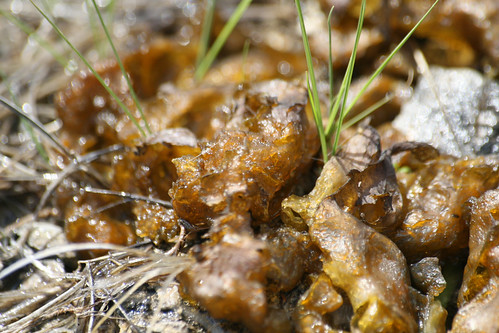
Cluster of cyanobacteria growing in cedar glade. Cedars of Lebanon State Park,
TN.
(*photo credit) April 22, 2012
Burning Hearts on Our Journey of Faith
Did not our hearts burn within us as he talked to us on the road and
explained the
scriptures to us.
(Luke 24:32)
The story in today's Gospel delves more deeply into the Easter
mystery, for we see this as a many-faceted Scriptural story. Too often we focus
on a small number of passages (proof texts) to justify our manner of acting or
to refute the practices of others with whom we disagree. In fact, our journey
of faith has many twists and turns and even unexpected episodes with which we
must cope. The word must penetrate our minds and hearts and allow us to see the
focus of the entire work of redemption in our lives.
Emmaus
involves excitement: the excitement of the unexpected resurrection event, and
yet anticipated throughout the spirit of Old Testament books. Jesus walks with
the disciples who are confused over the suffering Messiah, though this condition
is plainly foretold by the prophets. Today, the spiritually hungry are also
somewhat confused, needing to listen and focus on the Word of God. Being
familiar with the Scriptural road map means we must pause and study directions
we are privileged to have, to learn from Scripture, and yet see this as more
than an intellectual exercise.
Integrity:
The Emmaus road includes pulling away from the familiar so that we find
something deeper. The various Scripture texts need to be seen in an entirety
just as viewing a single road route without a comprehensive view of the larger
map is puzzling. We need Scriptural integration and the one who helps us do
this is Jesus himself. Like disciples on the road to Emmaus, we walk in faith
with heavy hearts seeking some form of companionship and direction. On
occasion, the stranger's understanding is far different from ours for it
includes a comprehensive understanding of the various passages of Holy Scripture
and a clearer direction on where we are going. By extending hospitality to the
stranger we find Jesus. By listening to him we allow our hearts to burn with a
spiritual hunger that all possess but few acknowledge. Amazingly this word is
coupled in the episode itself with resting, breaking bread, and sharing with
others through a return trip to Jerusalem.
Jesus as companion:
Emmaus is our journey to liturgical service, for we follow the liturgy of word
with that of the Eucharist, the presence of Jesus. Eventually we take our
message to others, but initially we need to listen and acquire skills and
spiritual stamina to assist others on their journey -- realizing that they, in
turn, help us as well. Growth in faith is a gradual process of comings and
goings, of coming to the Liturgy of the Word and Eucharist and then sharing our
experience with others. Emmaus is a joint journey; we designate this reflection
in the singular (journey) because each individual's personal journey of faith
involves others as well. We need constant companionship; Jesus always walks
with us, even when others abandon us at times.
Prayer:
Lord, help us to listen to the deeper Easter message.

Shooting Star, Dodecatheon meadia. Madison Co., KY.
(*photo credit)
April 23, 2012
Upward Mobility and a New American Dream
On January 9, 2012, the NPR "On Point" program with Tom Ashbrook
featured experts and listeners discussing the American dream of constant upward
mobility. A multitude of studies show that the United States is falling behind
Canada and much of Europe in the upward mobility of her population. Reasons
offered are many: culture, social environment, and demographics as well as drug
availability, single-parent family units, general environmental poverty,
disparity in income salaries, reduced social benefits, and lack of similar
educational opportunities. A startling and disturbing factor is that
governmental incentives for upping mobility go disproportionately to society's
upper middle class.
Mobility refers to the ability of a lower economic class to raise
the level for the succeeding generation or within a generation by opportunities
being afforded to raise one's status. Some
speak of relative mobility (with respect to one's beginning and ending point) or
an absolute mobility of the lower entering a higher more fixed economic class.
We Americans sincerely have dreamed in the past of continued betterment of first
generation to second and succeeding generations from a material economic
viewpoint. We glory that women no longer have to hand wash clothes or cook over
a wood stove or open hearth fireplace. However, some dreams are harder to
achieve. The flight of people to suburbs, acquiring individual cars, and
affordable college education and health care have all hit some walls in housing,
transportation choice, health care, and educational opportunities.
The traditional American Dream includes flaws, for continued increase in
consumer cultural attainment means increased resource use and resulting
pollution -- and such is unsustainable. We need to challenge overly
materialistic dreams as immature as far as our national aspirations are
concerned. A mobility that is called for in
Reclaiming the Commons
is
one of quality of life improvement, not a quantitative expansion or one of
social and environmental "obesity." There are limits to material, not
spiritual, growth; there are privileges that tend to insecurity in a world of
disparity of wealth; there are people in greater need; and sharing is a
qualitative benefit to all.
Spiritually we ought always to be upwardly mobile, hoping the next
generation will be better off than we are. Crafting a new "American Dream" is
absolutely necessary in this age of world environmental crisis and resource
limitations. Enlightened self-interest must give way to public interest; luxury
consumer products must be sacrificed for essentials for those who are in
destitution -- and this becomes an act of long-term national and global
security. Moderation in all things must include consumption of world resources,
which when shared, become a mark of an authentic upward mobility that we can be
proud.
Prayer:
Lord, help us be more mature in our dreams. Direct our hearts from material
goals to higher quality human service.
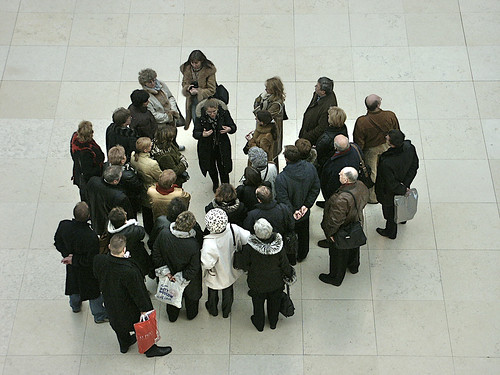
Gathering of receptive ears as message delivered publicly.
(*photo by Wayne Large, Creative Commons)
April 24, 2012
Prophet: Demonstrate Alone Publicly for Change
When Jesus drove moneychangers from the Temple he acted alone and
prophetically. His disciples were not accompanying him in use of whips and
expressions of justified anger. Certainly few would fault his actions of two
thousand years ago, but plenty of even devoted Christians would take a similar
prophetic person to task for such actions today. Fewer, far fewer if any, would
imitate Jesus in a world in which grabbers take from the commons what belongs to
all the people. However, a word for those who in subtle ways may counter the
crowd and yet influence them when needed:
Whistleblowing.
Someone or others sees a perceived injustice being done in a governmental agency
or a business establishment; even at the risk of losing a job or being
discredited by others this person reports the episode to a superior or enforcing
agency.
Today, a way of going out when exiting an operation is to do so with a bang, and
so blowing a whistle may seem highly attractive.
Reporting another.
This can be done concerning a possible misdeed by an individual or group.
Again, mere single fact, rumor or immediate observation can be deceptive and
ruin another person through false reporting. For instance, an item in a store
may be defective and the checking agent says to the customer to go back and get
another -- and another shopper considers it shoplifting.
Legal self-defense.
Some people regard the heroics of defending oneself in legal matters as
necessary, or through dislike or incapacity to hire lawyers and thus make an
effort at their own defense in court matters.
Argumentation.
Someone may regard a teaching matter or media presentation as faulty and thus in
a rather singular fashion speak out against the issue as presented. There is a
time and place for everything under heaven, but is this one such circumstance?
Self-immolation.
Certainly there should be another way! The
Arab Spring in 2011 started late the preceding year by the burning up of a
street vendor who felt this was a matter of last resort. Numerous Buddhist
monks did the same during the long Vietnam conflicts. Often such notoriety has
political punch, but ends never justify means.
Underdog
defense.
A public defense may be made for another, and, in many instances, actions of
Christians or other martyrs in defense of their leaders or ideals are still
occurring in 2012.
Street-preaching.
Some will proclaim their message to any who will listen; they may be regarded as
fringe operators -- but still worth allowing and perhaps hearing. Didn't
Jeremiah the prophet speak out at the city gates? The Internet broadens city
gates.
Prayer:
Lord, inspire me to speak, the right words to say, the audience to hear, and
empower them to act.
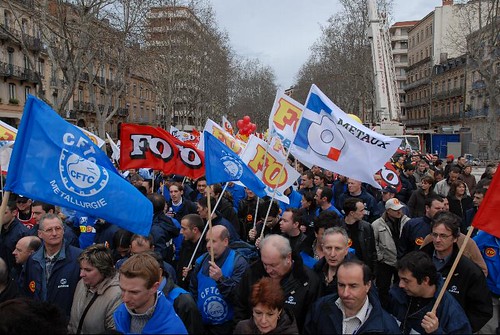
French transit demonstrators take their message to the streets.
(*photo by Guillaume Paumier, Creative Commons)
April 25, 2012
Solidarity: Demonstrate Publicly with Others
While anonymous Robin Hoods can have salutary effects, so can a
wide variety of public displays of support or opposition:
Street demonstrations and marches --
No one can deny the power of past street demonstrations such as during the
Vietnam War or the fight for social and racial justice. Social media tools can
help organize the power of the street as the Arab Spring has indicated.
Technical demonstrations and appropriate technology research --
Having run an appropriate demonstration center for a quarter of a century, I can
testify that this has a power along with the learning experience that allowed
for refinement of techniques and in ways of presenting them. However, such
places are expensive to maintain and staff in times of sparse funding.
Political demonstrations and organizing --
In a
democratic society, this public showing is an expression of citizenship and can
lead to more responsive legislators -- provided such candidates are outside of
the power of big business and easy access to the privileged few while ignoring
the voters all together.
Strike Demonstrations --
When work halts, those affected soon take notice and sympathize with or feel
anger against strikers. In essence, much can be accomplished through the
solidarity of strikers from improving work conditions to toppling governments.
Recreational demonstrations and parades --
Ceremonies and celebratory occasions (Macy's or Rose Bowl Parade) can be
opportunities to awaken public interest. This may prove a milder but effective
demonstration form combining fun and serious content.
Religious demonstrations
and sermons have had effective results from the times of crusades to processions
that oppose or support civil rights issues. Many have prayed in public with
others or in front of abortion clinics or weapons manufacturing plants or at the
"School of the Americas" in Georgia.
Educational demonstration and debate
--
A more intellectual approach may allow certain formal discussions, conferences,
or debates for or against certain issues of public interest.
Advertisements and displays
are public expressions of political and economic positions; in subtle ways these
can show or hide the true economic interests of advertising parties.
Media demonstrations
in this age include talk shows, interviews, news reports, or Facebook or Twitter
demonstrations of support or opposition. Social media sources are more
influential than anything since the printing press.
Prayer:
Lord, help us demonstrate at right times and places, and help our multitudes
speak with one voice.
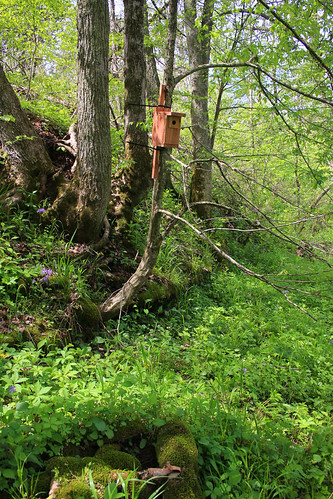
A prothonotary warbler box.
(*photo credit)
April 26, 2012
Lectures, Academic Rip-offs, and Free Education
The academic world needs a rare and critical review by those
outside the educational system. Why? Perhaps for more reasons that can be
enumerated in this reflection but including the following: rapidly escalating
inflationary costs of higher education; massive indebtedness of graduates who
find it difficult to get jobs; luxurious and wasteful classroom buildings,
libraries, and campus grounds; sports coaches with seven figure incomes and
using players with virtually no compensation; researchers with little concern
about students; and most of all the ineffectual lecture methods carried over
from Medieval times when books were scarce and notes had to be copied by hand.
Today, the party card is the academic degree, and the deeper the ivy cover, the
greater the possibility of future employment in a cushy job. The entire
educational enterprise would not be so bad except that critique is so scarce;
thus, merchants of the free market do not expect anyone in ivy halls (or other
schools for that matter) to criticize the hand that feeds them. Free enterprise
and academics go hand in hand, while the window of time to address and heal our
troubled planet is starting to close. Granted, some of the research showing
that closing comes from within academic circles, the basic reason for the
environmental crisis, namely the consumer culture, is left untouched, except for
a few critics.
Thank heavens it is from within the academic halls that critics
are emerging who can show that lecturing in science and elsewhere teaches far
less than other methods, some of which include a team approach to learning. I
am sure change in lecture practice will be delayed, but the rote lecture method
by a paternal figure punctuated with proper applause is somewhat outmoded. All
of us have heard good lectures at various times, but also many of us have
learned to have gained little except what we learned on our own in private
study. A change is in the wind. The massive numbers of people going to vast
lectures and turning back cookbook answers is coming to an end. Too much
formality in times of rapid change and free access to better approaches to
learning.
A more critical question resurfaces: why this vast educational
enterprise? Maybe one on one teaching of a musical instrument or within a
particular laboratory is needed -- but for a great number of educational courses
this is not the case. Why not develop teaching sessions by experts via Internet
(no expensive campuses) with admission free for the lower income folks? How
about learning on one's own and selecting what is best in the rapidly changing
world? I hope and pray that our Jesuit Society will rise to the occasion and
open free universities on the Internet for any who want to learn on their own --
more in keeping with the intentions of St. Ignatius. Is this an idle or a real
dream whose time is coming very soon?
Prayer:
Lord, help us to raise serious questions about the educational institutions that
need critical evaluation.

Melting glaciers near Stewart, British Columbia.
(*photo credit)
April 27, 2012
Polar Week and Arctic Thawing
Most of us readers have never been to the colder North or South
Pole regions, dislike the harsher effects of winter, and regard changes in the
poles as way beyond our everyday concerns. However, we ought to be concerned
because the condition of the entire Earth affects us all in some ways.
Ice sheet
thinning continues and the extent of the sea of ice gets smaller with each
succeeding summer before shortening winter expansions occurs again. The sheet
now covers far less territory during the summer season, to the surprise of
natives living in the region who are finding the lessening of winter often to
their own travel disadvantage with lack of frozen travelways.
Water
melt is gushing from under the Greenland icecap along with calving icebergs and
actual shifting of the land-based ice sheet itself. This Arctic melting is
occurring in relative lightning geological speed that rates events by thousands
of years; note that melting rates are far faster than predicted at the end of
the 20th century. As the remnants of the last ice age disappear, oceans rise
and heavily populated Asian lowlands and island nations in the Pacific will
become submerged. Deniers call it a natural cycle but human beings are also
part of the natural phenomenon -- and people make a difference as virtually all
scientists foresee.
Methane
is emitted from frosty landscape and from the Arctic Ocean. This phenomenon is
now becoming clearly observed as thawing occurs, and this bodes more ominous
than the troubles with polar bear habitat. We recall that methane has between
20 and up to 72 times the effects as does carbon dioxide over time. The
feedback of emitted methane and its greenhouse effects are extremely worrisome
with accelerating climate change.
Polar bear
struggles get some attention from wildlife experts who find that bear access to
feeding areas on land and water is more and more tenuous. The same can be said
of other forms of large wildlife as well, for their movements and adaption to
changing circumstances differ by wildlife species. Some, especially birds and
water animals can make transitions far faster than can land-based mammals. Is
survival of polar bears as a species going to be reduced to the confines of
zoos?
The
Northwest Passage
is opening and that is the only polar good news except perhaps for the increased
exploration for oil and natural gas in these thawing regions. The passage is
one phenomenon that was sought for at least four centuries up to modern times --
a quick and shorter travel route to get from Europe to the Far East. It is
possible during this century for heavily-laden merchant ships to travel the
ice-free route at least during much of the summer time and with extending months
as the century wears on.
Prayer:
Lord, give us an understanding of changes that are occurring in nature before
our eyes; give us the power to do good.

Emergence of a morel mushroom.
(*photo credit)
April 28, 2012
Ten Approaches to Stay Hopeful
Have you met people who have given up hope? I have, and it is
somewhat disarming. What can be said on the spur of the moment? Perhaps one or
other of the following approaches may help.p.p.p.
1.
Things will get better.
We always expect the best in everything from grades to movie endings, from a
medical prognosis to a final sports score. It's healthy to keep looking for
good.
2.
There are better days ahead.
Young
people want us to be positive so that their loads may be lightened. For
believers, eternal life ahead energizes our basic enthusiasm.
3.
We can make a difference if we act now.
We refuse to follow the merchants of doubt. The best way is to challenge those
who want to change course and turn in to their own self interest.
4. .
We are one struggling family.
Our hope is tied into the loving relationships of all in the human family who
are committed to helping each other and sharing in the essential needs of the
destitute and forgotten members.
5.
Here is a listening ear.
Instant communication throughout the world works to our favor, for often failure
to act results from the lack of communication and a resulting isolation.
Furthermore, rapid transportation allows us to alleviate the sufferings of
others in rapid time, thus shortening the period of their agony.
6.
Go, Occupiers on Wall Street.
We
hear the call of the Occupiers and agree that greed in all its forms must be
addressed and challenged. Ways are emerging to do this (see April 9, 2012).
7.
Great people
overcame imprisonment and great adversity.
As Vaclav Havel said,
I can hardly imagine living without hope. As for the future of the world, there
is a colorful spectrum of possibilities, from the worst to the best. What will
happen, I do not know. Hope forces me to believe that those better alternatives
will prevail, and above all it forces me to do something to make them happen.
8.
There is a cure out there.
Health knowledge, supplies, and facilities enable caregivers to address many of
the major health issues of our age. Spiritual healing is always possible.
9.
Listen to the Spirit.
The
willingness of all to enter into a peaceful world free from major mishaps stands
out as a possibility. Light appears if we open ourselves to the Spirit.
10.
Christ is in command.
As
believers, we hold that Christ has conquered in the power of his resurrection,
and we are enabled when this power rubs off on us and our neighbors.
Prayer:
Lord, give us hope and help us be hopeful to others.

Fresh bloom of an elder's rose.
(*photo credit)
April 29, 2012
Being Good Shepherds in an Addicted World
Today on the Fourth Sunday of Easter,
Good Shepherd Sunday,
we discover Jesus to be both shepherd and sheep gate, one who guards the flock
and the way the protected have safe passage in and out. The Good Shepherd goes
ahead of his sheep and leads them, and does not follow from behind and drive
them; he knows his sheep by name and gives them tender care; he goes out of his
way to find lost sheep; and he is devoted and will lay down his life for his
sheep. The gate is our way into a protected arena at night or a way out when we
desire to venture forth.
Many of us are unfamiliar with sheep and do not appreciate their
qualities as much as those who are herders and live near shepherds and flocks --
that is most of us. However, with a certain degree of sensitivity to animal
pets we learn to extend care to all God's creation, and this includes human
beings. Jesus' characteristics as shepherd are transferred to us as part of our
becoming shepherds. We are not to regard ourselves as docile and unprotected
sheep
(though at times of infancy this may be the case). Rather the story is intended
for the active Christian who must be
responsible
for the marginalized,
sensitive
to
others' needs, and
willing
to act when we can help others. We are responsible to help the addicted (no
denial);
we are sensitive enough to discover addicts as brothers and sisters and do what
we can to help them (no
excuse);
and we are moved to act freely out of love and not only see and work with
others, but immerse themselves into a world which needs change (no
escape).
How do we address the needs of those immersed in an addicted
world? One of our missions as mentioned in the Robin Hood discussion is that we
must startle the people who are addicted to change their ways. Being startled
and shaken is part of shepherding, for gentleness has its place, but only to
some degree -- tough love does also. Entering into the Easter mysteries
includes taking on new life and opening others to the possibilities that they
can do the same. Feed my sheep! Overcome the waywardness of our past and lead
others the right way.
How can we be good shepherds? Do we look out and see what is
wrong in our world? Like Jesus, do we confront the established order and
address problems directly? Do we show sensitivity for those who are
marginalized as Jesus did for the blind, the lame, and the sinners? Do we
listen to the call of the Lord? Can we speak up politically when our mountains
continue to be damaged beyond repair? Can we remind those who call themselves
pro-life that this includes saving our wounded Earth and abolishing the death
penalty? Do we confront addictions in all their forms whether substance abuse
like alcohol, drugs or food, Internet pornography, or desire to acquire one new
electronic device? Will we resolve to become good shepherds?
Prayer:
Lord, help us to recognize our role in shepherding
others in becoming agents of change in this troubled world.

Exploring the forest for new growth of ferns.
(*photo credit)
April 30, 2012
Keeping America Beautiful is Truly Earthhealing
This is s s s
Keep America Beautiful Week
and good preparation for ending the month and launching into the grand month of
May and its natural attractiveness for aesthetic mind and heart. Beauty and
healing go together because disorderliness is so associated with those who
despair of ever getting well, the truly sick. A person who seeks to beautify is
also one who seeks to heal -- and healing even in a world that will never be
totally healed is worth the attempt. Direct beautification to various aspects
of life:
Domestic:
Plant flowers around the property; put bouquets in the living space; repaint the
walls where they need a fresh look; turn the lawn and garden into a floral
landscape of rare and pragmatic beauty; make a colorful and tasty salad or main
dish; and enliven the website with attractive photos (as Janet Powell does to
adorn these Earthhealing website words).
Local Community:
The neighborhood can be beautified in many simple ways such as picking up trash
and junk; it also requires more coordinated efforts (see December 7, 2006 for
"Keep America Beautiful Day") concerning zoning efforts and community efforts at
preventing commercial sprawl, restricting signs and billboards and protecting
the natural beauty of the viewscape. Support efforts of civic, church, and
educational groups to enhance public space.
Regional:
Tourism has commercial value to a larger area and so statewide and citywide
efforts at urban homesteading pays off in the long run as much as reclamation of
abandoned mining areas or damaged farmland. Broader based beautification
projects build civic pride that has many unaccounted benefits. Roadways deserve
the added attractiveness of floral landscape, and this is often a statewide
project deserving attention when funding is tight.
National:
Wilderness areas are worth special attention when finances are tight and there
seem more important projects. However, keeping these areas protected and open
for general sightseeing and enjoyment takes the skills of dedicated workers who
are able to be employed for worthwhile efforts and who really enjoy the visible
effects of their labor. It involves the taxpayers who support their efforts as
well.
Global:
Heritage areas are worth championing, but who is left to do this with so much to
command our attention? Often the beautification of these unique areas takes
resources beyond the ability of residents in the affected areas. Preservation
works are healing at a broader level, way beyond merely maintaining potted
plants and community gardens. Beautification work has immense value beyond
monetary tags and yet deserves the preserving efforts. For more ideas visit <www.america-the-beautiful.org>.
Prayer:
Lord, help us to see that your eye for creative beauty must be ours as well;
give us the grace to champion beautification projects as an integral part to
play in healing our wounded Earth. |